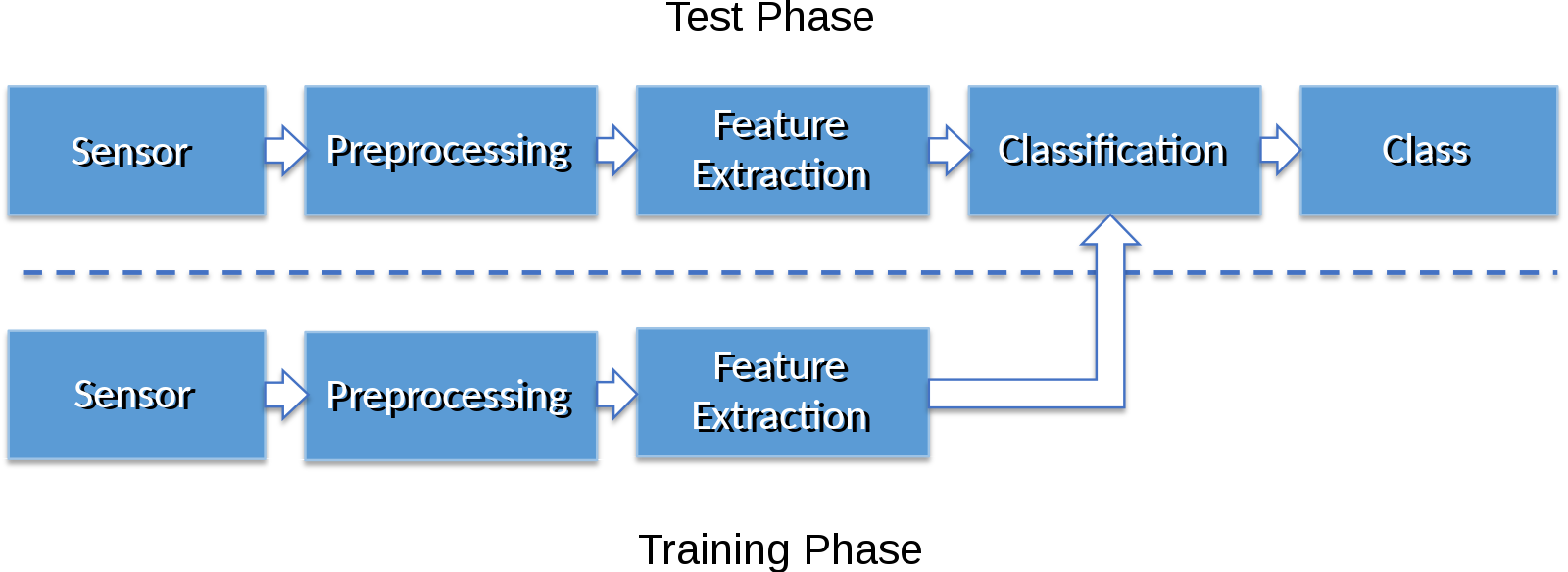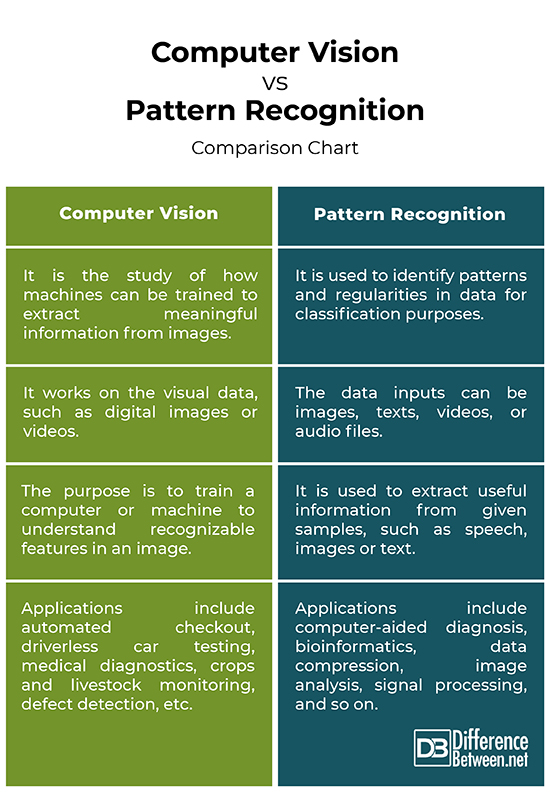Difference Between Computer Vision and Pattern Recognition
The computational analysis of images and more abstract patterns is a challenging task. This process is a low-level step in many computer vision applications. The idea is to look for visual clues in images that would help solve some problems. Computer vision technology involves capturing digital images (using image sensors), processing and analyzing images to gain some understanding of the visual input. For interpretation, computer vision is closely related to pattern recognition. Pattern recognition is closely akin to machine learning. Is pattern recognition same as computer vision?

What is Computer Vision?
Computer vision starts with images. It is a subset of artificial intelligence (AI) used to extract meaningful information from images. It trains computers to make sense of the visual world. Remarkable progress has been made in our understanding of computer vision, and the last decade has witnessed the first large-scale deployments of consumer computer vision technology. For example, most modern digital cameras now have embedded algorithms for face detection. From spotting manufacturing defects to automating checkouts in modern retail stores, computer vision is used across a wide range of industries, more than you might expect. Computer vision is one of the most remarkable technologies to born out of the artificial intelligence and deep learning world.

What is Pattern Recognition?
Pattern recognition is a method of data analysis that recognizes patterns and regularities in data by using machine learning algorithms. It is a study of how machines can classify objects into a number of categories and classes. It is similar to how your brain assesses the world around you. For example, when scrolling through a multitude of posts on a social media site, you suddenly stop when you see a familiar face. Similarly, pattern recognition is a technology that enables machines to detect arrangements of characteristics or data that yield some important information about a given system. It is a process of looking at data and trying to identify any regularities within the data. Pattern recognition is the basis of problem solving and designing algorithms.
Difference between Computer Vision and Pattern Recognition
Field
– There is no fundamental difference between the two because both the fields are associated with artificial intelligence and machine learning. All machine learning algorithms look for patterns in data. Computer vision is the study of how machines can be trained to extract meaningful information from images. CV involves capturing, processing and analyzing images for identification and classification. Pattern recognition is more of a field of machine learning used to identify patterns and regularities in data, and then classify the data based on the information gained from patterns.
Goal
– The purpose of computer vision is to train a computer or machine to understand recognizable features in an image. The idea is to make them interpret and understand the visual world as the human vision sees and understands it. The goal is to accurately identify and classify objects based on the similarities on the patterns. Pattern recognition, on the other hand, is used to extract useful information from given samples, such as speech, images or a stream of text. The idea is to analyze incoming data and try to identify patterns.
Data
– Computer vision starts with images; it mainly focuses on image recognition. It focuses on replicating parts of human vision system and enabling machines to gain high-level understanding of the visual data, such as digital images or videos. Pattern recognition is a much broader concept that involves identifying and understanding patterns in data. The data inputs can be images, texts, videos, or audio files. Pattern recognition is a fundamental element of problem solving and mathematical thinking.
Computer Vision vs. Pattern Recognition: Comparison Chart

Summary
Computer vision mostly involves processing and analyzing images to understand recognizable features in images. It is used across a wide range of industries to enhance the consumer experience and reduce costs. It is one of the most remarkable technologies that born out of the artificial intelligence and deep learning world. Pattern recognition is the identification and classification of input data, such as text, speech and images, using machine learning algorithms by delineation of patterns in the given data. Computer vision mainly deals with visual data such as images or videos, whereas pattern recognition deals with audio files, videos, images, text and much more.
What is pattern recognition in computer vision?
For interpretation, computer vision is closely related to pattern recognition. Pattern recognition is to give machines the ability to identify patterns in data as humans would do.
What is computer vision used for?
Computer vision focuses on replicating parts of human vision system and enabling machines to gain high-level understanding of the visual data, such as digital images or videos. It is used to train machines to make sense of the visual data.
Is CVPR a good conference?
Usually held in June, Conference on Computer Vision and Pattern Recognition (CPVR) is the premier annual computer vision event which is regarded as one of the most important events in its field.
Is computer vision accurate?
Owing to the technological advancement, the last decade has seen a massive development in the consumer computer vision technology. The processing power, memory, and storage capacity of computer has vastly increased, and so has the accuracy rates for object identification.
What is computer vision and its application?
Computer vision is a field of machine learning and AI that deals with how computers can be trained to derive meaningful information from digital images or videos. It is used across a wide range of application areas, such as face recognition, defect detection, assembly verification, intruder detection, and so on.
- Difference Between Caucus and Primary - June 18, 2024
- Difference Between PPO and POS - May 30, 2024
- Difference Between RFID and NFC - May 28, 2024
Search DifferenceBetween.net :
Leave a Response
References :
[0]Prince, Simon J. D. Computer Vision: Models, Learning, and Inference. Cambridge, United Kingdom: Cambridge University Press, 2012. Print
[1]Krig, Scott. Computer Vision Metrics: Survey, Taxonomy, and Analysis. New York, United States: Apress, 2014. Print
[2]Theodoridis, Sergios and Konstantinos Koutroumbas. Pattern Recognition. California, United States: Academic Press, 2003. Print
[3]Image credit: https://commons.wikimedia.org/wiki/File:Computer_vision_sample_in_Sim%C3%B3n_Bolivar_Avenue,_Quito.jpg
[4]Image credit: https://commons.wikimedia.org/wiki/File:PatternRecognitionSystem.svg
